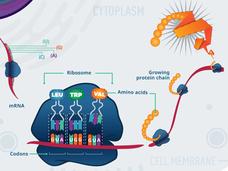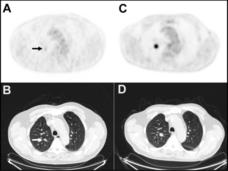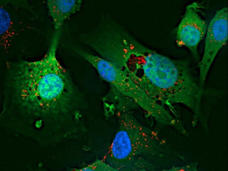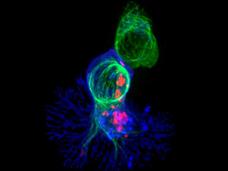Biology of Cancer - Cancer Currents Blog
Cancer biology research news, with context from experts at NCI and elsewhere. Topics include cancer metastasis, the tumor microenvironment, and new targets for cancer therapies.
-
Curbing Production of Immune Checkpoint Protein Slows Liver Cancer in Mice
Researchers have found an unconventional way to unleash the immune system against liver cancer in mice. The researchers used an investigational drug to curb the production of a checkpoint inhibitor protein that shields tumors from the immune system.
-
Glioblastoma Study Highlights Sex Differences in Brain Cancer
Men and women with glioblastoma appear to respond differently to standard treatment. A new study identifies biological factors that might contribute to this sex difference.
-
For Early-Stage Lung Cancer, Study Identifies Potential New Biomarker, Treatment Target
A new study has identified a potential biomarker of early-stage non–small cell lung cancer (NSCLC). The biomarker, the study’s leaders said, could help diagnose precancerous lung growths and early-stage lung cancers noninvasively and distinguish them from noncancerous growths.
-
Drug Combination May Target the Unique Metabolism of Leukemia Stem Cells
Two new studies show how the drugs venetoclax (Venclexta) and azacitidine (Vidaza) team up to block the unique metabolism of leukemia stem cells and may explain why the drug combination is effective against acute myeloid leukemia.
-
Appendix Cancers Are Genetically Distinct from Other Gastrointestinal Cancers, Study Shows
The largest-ever study of DNA changes in appendix cancer shows that it is distinct from colorectal and other gastrointestinal cancers and suggests that specific mutations in appendix tumors may help predict whether they may be aggressive.
-
Exosomes May Help Tumors Evade Immune System
A new study has identified what may be an important and previously unknown route by which tumors evade the immune system: They secrete small membrane-encased sacs, called exosomes, studded with a protein that dials down the immune response.
-
Two Drugs Work Together to Block ‘Master Regulator’ of Breast, Other Cancers
Arsenic trioxide and retinoic acid work together to target the master regulator protein Pin1, a new study shows. In cancer cell lines and mice, the drug combination slowed the growth of triple-negative breast cancer tumors.
-
High-Fat Diet or Diabetes Drug May Enhance Response to Targeted Cancer Drug
A study in mice may have identified a way to help overcome resistance to targeted cancer drugs known as PI3K inhibitors. The approach appears to work by reducing insulin levels in patients receiving these drugs.
-
OncoArray Links Dozens of DNA Variants to Risk for Common Cancers
Researchers with the NCI-supported GAME-ON initiative and OncoArray Network are publishing studies identifying dozens of new genetic variants associated with the risk for developing some of the most common cancers.
-
Can Immunotherapy Succeed in Glioblastoma?
Despite continued efforts to develop new therapies for glioblastoma, none have been able to improve how long patients live appreciably. Despite some setbacks, researchers are hopeful that immunotherapy might be able to succeed where other therapies have not.
-
Molecular Switch Links High-Fat Diet to Prostate Cancer Metastasis
A new study in mice has revealed a molecular link between a high-fat diet and the growth and spread of prostate cancer. The findings, the study leaders believe, raise the possibility that changes in diet could potentially improve treatment outcomes in some men.
-
New Cancer Treatment Approach Targets Circadian Clock
Two compounds that target components of the circadian clock killed several types of cancer cells in the lab and slowed the growth of brain tumors in mice without harming healthy cells, a new study showed.
-
Gut Bacteria Influence Effectiveness of a Type of Immunotherapy
Using mouse models of cancer, researchers found that altering the gut microbiome could affect whether tumors responded to checkpoint inhibition.
-
TARGET Study Finds Major Differences between Childhood and Adult AML
An NCI-funded study has found significant differences in the genetics of acute myeloid leukemia in younger and older patients. The findings could help guide the development of treatments tailored specifically for childhood AML.
-
The Challenging Landscape of Cancer and Aging: Charting a Way Forward
NCI Director Dr. Norman Sharpless discusses research on aging and cancer, including understanding the biology of aging and its relationship to cancer, the treatment of older patients, and ensuring older patients participate in cancer clinical trials.
-
Study Finds Biological Differences in Lung Tumors of African Americans and Whites
Patterns of gene expression may be different in the tumors of some African Americans than in those of whites, a new study has found, and these biological differences may contribute to racial disparities in lung cancer.
-
Fusobacterium May Help Colorectal Cancer Grow and Spread
Fusobacterium, found in the stomach and intestines, may help fuel the growth of colorectal cancer and metastases. In a mouse model of colorectal cancer, using antibiotics to kill these bacteria slowed tumor growth.
-
With Advances in Cancer Immunotherapy, Scientists Discuss Need to Develop New Mouse Models
A recent NCI symposium focused on developing new and better mouse models for testing treatments that harness the immune system against cancer.
-
Fat Cells May Hinder Effectiveness of Chemotherapy
Researchers have shown that fat cells can absorb two commonly used chemotherapy drugs and break them down chemically into a less toxic form, potentially reducing the drugs’ effectiveness.
-
Many Ovarian Cancers May Start in Fallopian Tubes, Study Finds
A new study provides more evidence that the most common form of ovarian cancer may originate in the fallopian tubes, and that there is a window of nearly 7 years between development of fallopian tube lesions and the start of ovarian cancer.



















